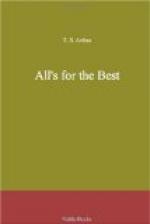In the midst of our confusion, uncertainty and distress, my uncle, the only relative of my mother, arrived, and from him we learned the crushing fact that my father’s paper had been that day dishonored at bank. In other words, that he had failed in business.
The blow, long suspended over his head; and as I afterwards learned, long dreaded, and long averted by the most desperate expedients to save himself from ruin, when it did fall, was too heavy for him. It crushed the life out of his enfeebled system. That fearful night he died!
It is not my purpose to draw towards the survivors any sympathy, by picturing the changes in their fortunes and modes of life that followed this sad event. They have all endured much and suffered much. But how light has it been to what my father must have endured and suffered in his long struggle to sustain the thoughtless extravagance of his family—to supply them with comforts and luxuries, none of which he could himself enjoy! Ever before me is the image of his gradually wasting form, and pale, sober, anxious face. His voice, always mild, now comes to my ears, in memory, burdened with a most touching sadness. What could we have been thinking about? Oh, youth! how blindly selfish thou art! How unjust in thy thoughtlessness! What would I not give to have my father back again! This daily toil for bread, those hours of labor, prolonged often far into the night season—how cheerful would I be if they ministered to my father’s comfort. Ah! if we had been loving and just to him, we might have had him still. But we were neither loving nor just. While he gathered with hard toil, we scattered. Daily we saw him go forth hurried to his business, and nightly we saw him come home exhausted; and we never put forth a hand to lighten his burdens; but, to gratify our idle and vain pleasures, laid new ones upon his stooping shoulders, until, at last, the cruel weight crushed him to the earth!
My father! Oh, my father! If grief and tearful repentance could have restored you to our broken circle, long since you would have returned to us. But tears and repentance are vain. The rest and peace of eternity is yours!
XII.
THE CHRISTIAN GENTLEMAN.
IT has been said that no man can be a gentleman who is not a Christian. We take the converse of this proposition, and say that no man can be a Christian who is not a gentleman.
There is something of a stir among the dry bones at this. A few eyes look at it in a rebuking way.
“Show me that in the Bible,” says one in confident negation of our proposition.
“Ah, well, friend, we will take your case in illustration of our theme. You call yourself a Christian?”
“By God’s mercy I do.”
Answered with an assured manner, as if in no doubt as to your being a worthy bearer of that name.
“You seem to question my state of acceptance. Who made you a judge?”




